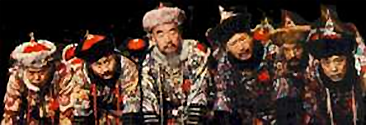ABOUT SHAW /
Shaw Organisation, 1970 Shaw Organisation, 1970
Shaw & Shaw Singapore and Shaw Brothers Hong Kong, 70s
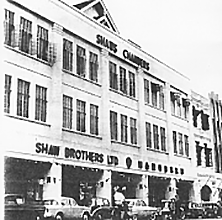
The first head office of Shaw Brothers at Robinson Road
In 1969, Shaw Brothers Pte Ltd in Singapore became Shaw & Shaw Pte Limited. In Hong Kong, Shaw Brothers (HK) issued shares and became a public listed company.
With the success of martial arts films started by 'Five Fingers of Death' in 1971, Shaw Studios in Hong Kong began to co-produce films with western producers for the international market.
Throughout the 1970s, these co-productions resulted in films like Dracula and the 7 Golden Vampires (1974 - a Shaw/Hammer production starring David Chiang and
Peter Cushing), Supermen Against the Orient (1974 - a Shaw/Indief Film Co production), Blood Money (1974 - a Shaw/Harbour production), Virgins Of the Seven Seas (1974 - a Shaw/Wolf Hartwig production), Shatter (1974 - a Shaw/Hammer production),
Cleopatra Jones and the Casino of Gold (1975 - a Shaw/William Tennant production),
Cannonball (1976),
Meteor (1978 - a Sandy Howard/Gabriel Katzka production in association with Run Run Shaw),
Inseminoid (1981 - a Shaw/Jupiter Films production) and
Blade Runner (1982 - a Shaw/Ladd production).
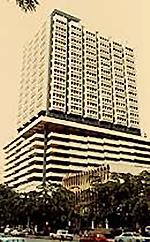
Head office of Shaw & Shaw Pte Limited moved to Shaw Centre in 1978
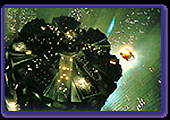
Screenshot of Blade Runner
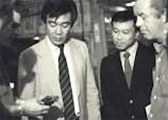
Shaw Vee King and Mr Harold Shaw on the set of Bladerunner
These co-productions raised production standards in Hong Kong as it gave cast and crew from the Shaw studios the opportunity to learn first hand from Hollywood and Europe.
While the mainstay of the Shaw company in Singapore was then the distribution and exhibition of films produced at the independent Shaw Studios in Hong Kong as well as other foreign producers (USA companies - Universal, Warner Brothers, United Artists;
British companies - British Pathe, Lion International, Anglo Amalgamated, Regal Internaitional, Britannia Films, Commonwealth United Entertainments etc), they were also purchasing property around their regional cinemas especially in Singapore and Malaysia. Their real estate portfolio include office blocks, apartment buildings, shopping arcades and hotels.
In 1978, Shaw & Shaw Pte Limited moved its headquarters to the new 25 storey Shaw Centre on 1 Scotts Road.
Management staff at this time were: Mr S Y Liok (General Manager), Mr Tan Beng Geok (Company secretary), Mr Ong Choa Huat (Chief Accountant), Mr Cheong Hoi Weng (Head of Booking), Mr C Y Chen (Head of Publicity and Advertising), Mr Chua Tan (Head of Chinese Department), Mr Osman Abdullah (Head of Malay Department), Mr I S Menen (Head of Indian Department), Mr Quek Kim Chuan (Head of Equipment Department), Mr C S Tan (Head of Property Department), Mr Shaw Vee Tzan (Head of Amusement Parks).
Shaw Empire, 70s
"From the small screen, black and Normal movies, to the bigger screen, to colour and from colour to the talkies, every change was a big boom and I was able to take advantage of all of them because I had the film and I had the theatre."
- Sir Run Run Shaw, Choice Lifestyle, March 1990
The world wide cinema chain operated by the Shaw company headquartered in Singapore in the 1970s grew to 230, dotting Southeast Asia, Hong Kong, Japan, Australia, North America, Hawaii and Canada. It was reported that during the 1970s, at least 1.5 million people see a Run Run Shaw produced movie every week usually in one of the cinemas in the Shaw chain or one of the 600 with whom the Shaws had distribution deals.
Under the Shaw banner were also shown films made in India, Pakistan, Philippines, Taiwan, Japan, Indonesia, Thailand, Vietnam, USA and Europe - making Shaws by far the largest distributors of motion picture films produced globally.
In Singapore, this decade saw the emergence of cinemas like the Singapura, President, Savoy, Liberty, Republic, Woodlands and Changi.
Supervising the Singapore theatres was Mr Seah Peng Chow and his assistants, Mr G. R. Nalla and Mr Teo Hock Tang.
At that time, Changi, President and Republic showed only Chinese language films while Savoy, Changi, Woodlands and Liberty showed mainly English language films. Singapura in Geylang showed Malay, Tamil and Hindustani films.
By 1980, Dolby surround sound had become standard throughout the circuit. Efficiency within the projection booth also took a leap forward with the auto-wind platter system and other film handling automation being widely adopted.
Throughout this decade, Shaw Studios in Hong Kong employed people by the thousands to feed the kung fu genre craze not only in Asia but around the world. The film that started this craze in the west was 'King Boxer' aka 'The Five Fingers of Death' (1973).
To spearhead worldwide sales of Shaw's prolific output, then film buying team of Mr Harold Shaw and Mr Shaw Vee King turned simultaneously film salesmen in the international film markets. As a result films bearing the "SB" trademark were seen in USA, Germany, Italy, Japan, UK, South America, Africa, Australia, the Middle East, Greece, Formosa and many other countries.
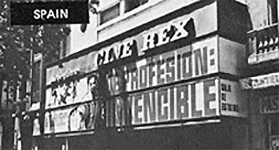
King Boxer in a spanish cinema, Spain, 1973
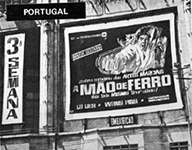
King Boxer in a portugese cinema, Portugal, 1973
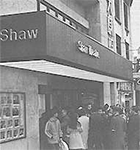
Shaw Theatre, Vancouver, Canada, 1971
Television Broadcasts Limited, Hong Kong
In 1973, Sir Run Run Shaw launched TVB, Hongkong's first wireless commercial TV station. Since then, TVB has established by far the highest viewer ratings in Hong Kong and Southern China with more than 70% market share. In 1980, Sir Run Run Shaw became chairman of TVB as well as it's largest shareholder. By 1986, Shaw Movie Town and the studios were leased to TVB for television production. On November 1988, TVB was listed on the Stock Exchange Hong Kong. TVB operates two channels, Chinese language Jade and English language Pearl.
TVB is the leading producer of Chinese language programmes in the world with most of its annual output of 6000 hour programme dubbed into seven different languages and distributed in more than 30 countries by its international arm TVBI.
Today, TVB is ranked among the top 5 largest TV producers in the world based on output.
Established in 1976, TVB's international arm TVBI also enjoys exclusive rights to distribute the titles from TVB's famed 45,000-hour programme library.
TVBI supplies programmes to free-to-air broadcasters, cable and satellite service operators and licensed video distributors throughout North and South America, Europe and the Asia Pacific region.
TVB and TVBI are located next to Shaw Brother's headquarters in Clearwaterbay. The facility is known as TV City and is Asia's largest commercial television production centre. It includes a state-of-the art master control centre, 51 video post-production suites, 14 production and news studios, and Asia's largest live audience commercial television studio. TVB employs almost 4000 staff and artistes, more than half of whom are engaged in programme production.
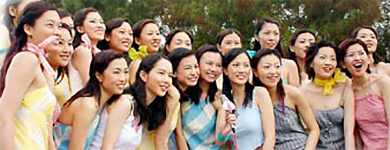
Miss Hong Kong 2000 - The annual pageant is one of Hong Kong's highest rated shows
In 1990, the company made an application for a satellite television link up license and set up its own distribution operations in the US and UK to handle home videos. By April 1997, TVBI was operating a franchised video chain called `TVB Video' in Vancouver, Canada. A video chain along similar lines have also be established in the UK.
In December 1994, TVB (USA) Inc, a subsidiary of TVBI, began beaming the Jade Channel via satellite directly to viewers in the US nationwide.
This was a follow up to the successful launch of TVBS earlier in 1993. TVBS is a Mandarin satelite channel, distributed via cable in Taiwan, Philippines, Singapore and Thailand which proved profitable in just 3 years.
This early success set a precedent for TVBI to penetrate other global mandarin speaking markets.
In China, TVBI is now licensing programming to leading free-to-air and cable television channel operators. By April 1997, TVBI's satellite-delivered Chinese-language service in Europe, TVBS-E, began transmission by the latest digital compression technology throughout Europe and UK.
In November 1999, TVB announced a joint venture with MEASAT Broadcast Network Systems Berhad of Malaysia (MBNS) to incorporate an Internet subsidiary company called TVB.COM. MBNS invested US$30 million in the project for a 30% stake.
Funding from revenue and other external sources was anticipated at over US$100 million for the project. TVB.COM aims to be the dominant Chinese language portal that will host a spectrum of net broadcasts and interactive services.






